The countertop chosen for a restaurant directly affects the functionality and efficiency of the space. There are many countertops to use, each of them made of different materials, including solid surface, granite, marble, stainless steel, quartz, concrete, wood, etc.
In this article, we will take a look at the most common materials used to make restaurant countertops and their impact on workflow. Alongside this, we will discuss salient matters like the major types of commercial countertops for restaurants, factors to consider when choosing the right countertop, and so many more.
What are Restaurant Countertops?
Restaurant countertops are basically meant for serving food and drinks. However, they also function as ice stations, cash counters, and food or drinks stores. Additionally, they serve as a division between the cooking area and eating area, allowing customers to receive their orders from the kitchen easily.
Not only are they serving counters, but they also help maximize seating space. Literarily, restaurant countertops are the focal point of any restaurant.
4 Types of Commercial Countertops for Restaurants
Commercial countertops used at restaurants can be broadly classified into four categories, which are bar countertops, food counter displays, cashier counters, and kitchen counters. They are discussed below:
Bar Countertops
These countertops are often placed just outside the kitchen and are used to serve food and drinks to individuals sitting on the opposite side of the counter or to waiters who distribute the food and drinks to diners seated in the restaurant seating area.
They are constructed to be durable, easy to clean, and resistant to stains, spills, and scratches that can be caused by staff while serving or by customers.
Food Counter Displays
These restaurant counters are commonly found in patisseries, cafes, bakeries, and coffee shops. They are made with glass or plexiglass materials that can be seen through, allowing the restaurant to showcase the food they offer, such as cakes, desserts, sandwiches, etc.
They are constructed to be visually appealing and hygienic, allowing customers to view the displayed food while maintaining safety standards. The food counter displays may also include features like refrigerators or heating appliances to keep the food fresh and at the appropriate temperature.
Cashier Counters
These commercial bar tops (Learn: Bar Tops Materials: Explore Your Right Option) are where transactions take place. Sometimes a booth can be designed for the cashier to stay while he receives payment through the counter. Other times, the cashier stays directly opposite the counter.
They are constructed to be sturdy, secure, and functional to handle cash registers, POS systems, and other accounting equipment. The cashier counters are designed with features like adequate storage space, accessibility for staff, and lockable drawers or compartments for security purposes.
Kitchen Counters
These commercial countertops are the workhorses of any restaurant kitchen. They are helpful for food preparation and storing cooking appliances and ingredients. Kitchen countertops are designed to withstand heavy-duty use and meet specific health and safety regulations, such as the Food and Drug Administration.
Also, they are constructed to be highly durable, heat-resistant, and very easy to clean. Ample space should be available for free and smooth cooking.
7 Materials of Restaurant Counters
There are several materials that can be used for making restaurant countertops. But shortlisted below are the 7 most popular materials, their features, pros, and cons.
Solid Surface
Solid surface is a commercial bar counter material that’s fully engineered and composed of a mixture of resins like acrylic, polyester, and stone-derived filler. It’s similar to granite but offers more versatility. Solid surface countertops are high-end customized products and the target customers are commercial users. They are non-porous and are easy to clean and repair.
Pros
- Solid surfaces are more customizable
- There are more colors and patterns to choose from
- The seams are easy to hide during installation
- They are resistant to most corrosive acids and don’t require sealants
- The perfect option for restaurants seeking a clean, uniform design
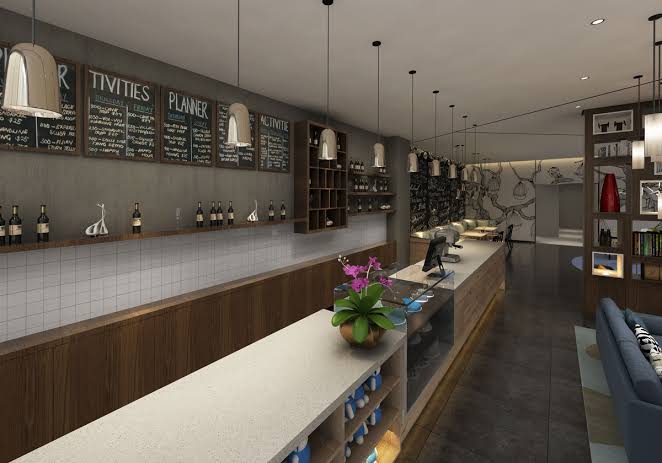
Cons
- Solid surfaces are quite expensive
- Extreme heat can cause damage to the surface
- The engineered designs mean their appearance and character won’t be natural as other materials like quartz and concrete
Granite
This is a natural stone material that isn’t just used commercially for restaurant counters, but also largely used by homeowners. It begins as a rock compressed for millions of years, in which various minerals merge together. This results in the white and gray swirling that it is popularly known for. Granite can be customized to several polished and textured finishes.
Pros
- Strong and recyclable, making it a durable and eco-friendly option
- High valuation even after years of usage
- Easy to clean and highly resistant to heat, stains, and scratches
- Contributes to the luxurious and earthy visuals of the restaurant
Cons
- Granite is very heavy and requires a strong support system
- The material is quite expensive
- Requires routine maintenance, such as frequent sealing to prevent moisture and bacteria from seeping into the material pores
- Once installed, the style and color of the countertop cannot be changed
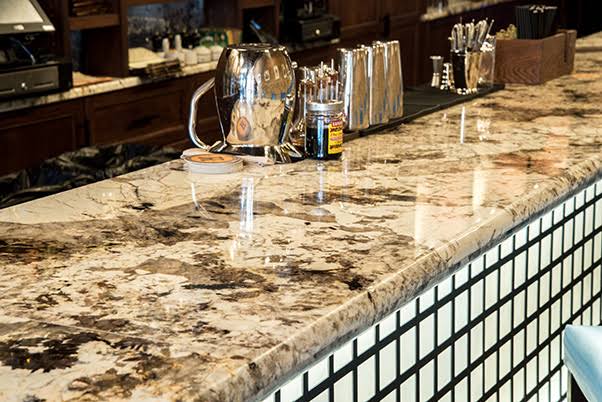
Marble
This material used in making bar counters for restaurants begins as limestone. But after being exposed to high levels of pressure and heat, it is shaped and molded. Impurities that interfere with the process are easily recognizable as they combine to form thin veins and bands of colors.
Pros
- Marble offers a stylish and elegant appearance that complements the design of any space
- It’s highly resistant to heat, making it suitable for temperature-sensitive areas like bakeries
- Comes in various natural colors and engineered designs
Cons
- Marble is susceptible to moisture and stains, particularly alcohol and acids
- It’s a soft stone that tends to chip and scratch
- Requires high maintenance and frequent sealing
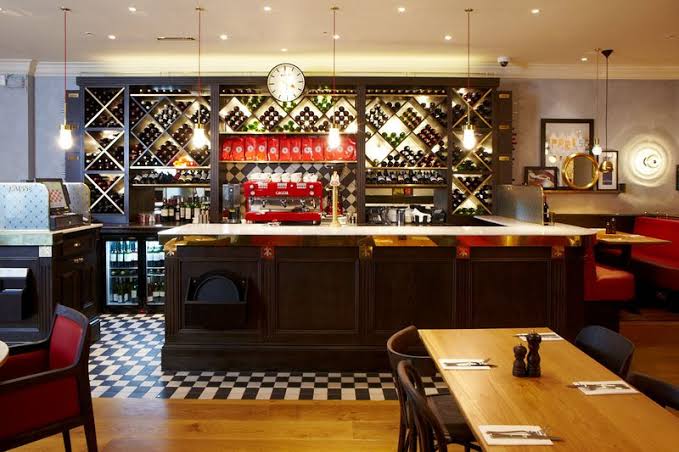
Stainless Steel
This is one of the notable non-porous countertop materials with unparalleled durability and resistance to bacteria, hence why it is a classic choice in the food service industry. Stainless steel can be polished to shine and luster.
Pros
- Stainless steel is easy to sanitize and clean
- The material is sustainable and ideal for an eco-friendly commercial bar counter
- Perfect for bar countertops that require heat-resistant work surfaces without using sealants
Cons
- Stainless steel leaves little room for creativity, limiting the chances of complementary design with the restaurant décor
- Most stainless steel easily attract smudge, dust, and fingerprints, hence frequent cleaning is needed
- Because of the material’s density, the countertops cause noise pollution while working
- The material is susceptible to dents and scratches, which requires professional restoration
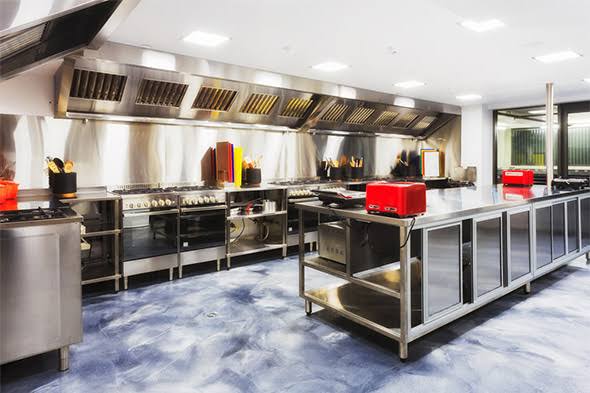
Quartz
Quartz restaurant countertops are made from quartz resin and pigment, which sometimes have coarsely ground stone inside for a flecked appearance. Others without the coarsely ground stone have a more uniform design. Quartz is a great material used in making a hygienic bar counter for restaurants.
Pros
- Looks great and has an endless selection of colors and patterns to choose from
- Durable and non-porous, so it’s easy to clean and requires no sealing
- High resistance to stains and cracks, which makes it a long-lasting investment
Cons
- Not best for people seeking a unique, uniform appearance
- Can be expensive depending on the size and design
- Very heavy, so there is a need for a strong support system
- Not good at resisting heat when compared with other materials like granite and stainless steel
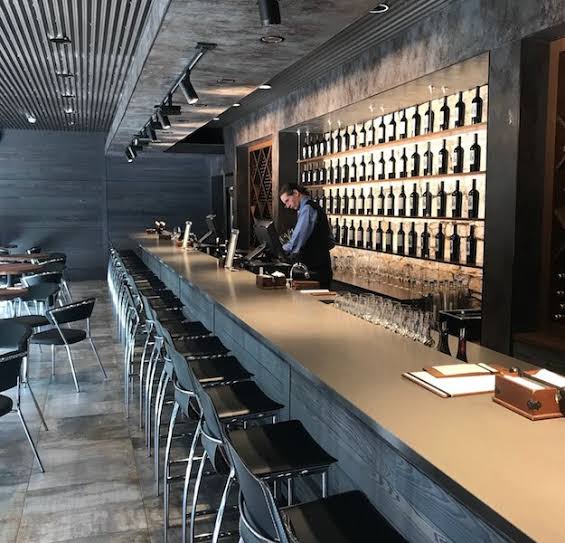
Concrete
Concrete countertops are made using mortar and pigment, which are then sealed to form a non-porous surface. They can be molded into various shapes and visually appealing in-lays can be included for enhanced design. While the concrete was predominantly used in industrial designs, the material is becoming popularly used in the food industry because of its ability to blend with different styles.
Pros
- Suitable for a stain and heat-resistant work surface
- Best for people seeking a versatile option that can adapt to their space
- Concrete countertops can be used both indoors and outdoor
Cons
- Very heavy, so an adequate support system is needed
- Require frequent sealing to prevent stains and maintain their non-porous structure
- Tend to form small cracks over time
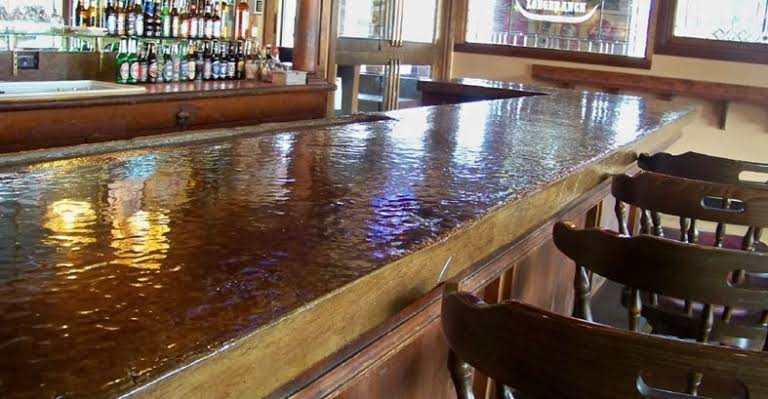
Wood
This is one of the best kitchen countertop materials that offer a warm and inviting ambiance. Wood commercial bar tops are available in various colors and grains, offering a perfect fit for any space. They can be made in two styles – edge grain and end grain. Edge grains are parallel to one another, while end grains are usually in many shades of wood and they form a checkerboard pattern.
Pros
- Visually enticing and offer great appeal to the restaurant space
- When sealed properly, wood countertops are easy to clean and resistant to bacteria
- They are biodegradable
Cons
- Wood swells and contracts when it absorbs moisture, making the countertop to look unattractive and imbalance
- The countertops must be sealed and sanded frequently for guaranteed protection from moisture, germs, and to retain the appealing appearance
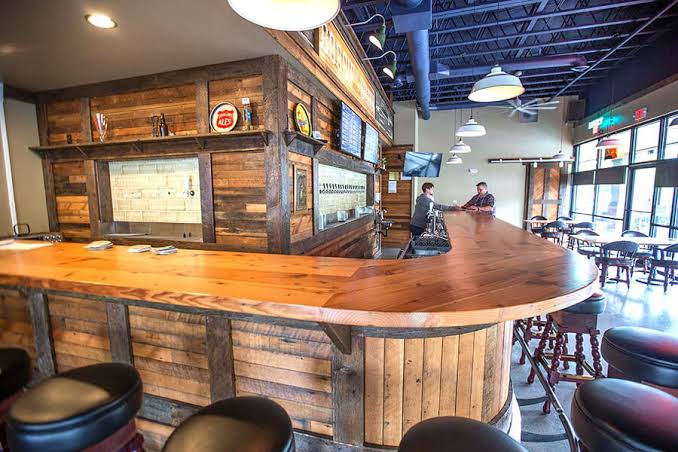
Factors to Consider When Choosing the Right Countertops
Countertops are a major investment in the restaurant (Learn: 5 Laundry Room Countertop Materials that Power up Business) business. When chosen correctly, they will last for years and contribute to the performance of the business. Whether furnishing a new restaurant or renovating, these are the factors to consider when choosing restaurant counters:
Durability
This refers to the countertop’s ability to withstand the daily rigors associated with their use, such as scratches, stains, spills, dents, rusts, heat, corrosion, and moisture. Consider the activities that will be done on the counter and choose wisely. For example, if a lot of cutting or heat-related projects will be done, choose a surface that can withstand these harsh conditions.
For countertops used in commercial applications and high-traffic areas, select those made with extremely strong materials like solid surfaces, granite, stainless steel, and quartz that can stand against daily wear and tear.
Maintenance
Some homeowners and business operators prefer bar countertops that require low maintenance, so they don’t have to sacrifice many hours of the day to clean them. Low-maintenance countertops are also important so that workday operations won’t be interrupted when it’s time for repair or resealing.
On the other hand, some homeowners and business operators don’t pay much attention to maintenance. Rather, they are more focused on the stability and style that come with the countertops even though they require higher maintenance.
Cost
When considering the cost, don’t focus on the initial price of the commercial bar tops. Evaluate the ongoing care and maintenance costs. Also, put some money aside for miscellaneous, which will serve as a cost for repairs, resurfacing, and resealing. Know that some countertops require specific care products with instructions, and some others may be prone to damage. All these factors should be considered before collating the budget.
Additionally, the budget allocated for different restaurants will be different depending on the space, concept, and overall design. And the counter’s cost varies since they are made of different materials and features that may increase the cost.
Style
Consider the overall theme, décor, and branding of the restaurant. Different materials offer varying styles, such as sleek and modern looks or rustic and traditional looks. For instance, stainless steel restaurant counters can offer a contemporary and professional look, while granite offers a flashy design and a touch of elegance. So, it’s crucial to choose countertops that match the restaurant design scheme.
Style and appearance go hand-in-hand to influence how diners perceive restaurants. The bar countertops should look clean and reflect the uniqueness of the establishment. Note that some counter materials like wood change their looks as they age. However, this can be fixed by frequently resurfacing and resealing them to look new.
Heat Resistance
In restaurants, countertops will surely come in contact with hot pans, pots, or cooking appliances. Therefore, they need to be resistant to heat if they must last long and function optimally. Check for a commercial bar counter made with heat-resistant materials like solid surface, granite, or stainless steel that are known for their capability to withstand high temperatures without warping or discoloration.
On the other hand, a material like quartz is quite good at resisting heat, but it is incomparable to other materials. There are some levels of high temperatures where quartz countertops will fail.
Essential Elements of Bar or Food Service Counters
While choosing the best counter for a restaurant, don’t just focus on the type of material or the durability, maintenance, cost, style, or heat resistance. Check for the other sections included, such as storage cabinets, waste disposal, display shelves of barware, and other essential fit-outs.
Storage Cabinets
Storage cabinets are essential for properly storing food and drinks, as well as appliances that are used in the restaurant. Different types of food and drinks have a set of needs. For example, beers and cold drinks need to be kept in the refrigerator, as they are best served cold. While wine needs to be kept in a warm temperate like counter cabinets.
The size and number of cabinets the counter must have depend on the quantity of beverage that needs to be stored for quick access. Also, how the cabinets are arranged also matters if determining how easy the drinks will be easy to access.
Waste Disposal
Another essential element of bar or food service counters is waste disposal, which needs to be easily accessible to maintain cleanliness. The size and location of the waste storage should be made judging from the seating pattern and capacity of the restaurant.
For improved functionality, the countertop can be constructed to have waste holes. This ensures that scraps are easily discarded into the holes for efficient waste disposal, which helps staff avoid walking all the way to the trash cans at regular intervals. And waste bins should be placed at every corner of the building so that customers can easily dispose of scraps.
Display Shelves of Barware
One of the most intriguing and captivating components of a bar is the display shelves, especially if they are made with transparent glasses with an inner light to showcase the content of the shelves. It is best they are attached to the restaurant counters to create visual appeal to customers and help them make a quick decision on their order.
On the other hand, commercial bar counter racks that allow glasses to hang upside down can also be considered for efficient wine serving and a clean, industrial look.
Other essential Fit-Outs
Some other elements that can be included in the bar or food service counters are the dishwasher, microwave, fridge, etc. These appliances will help improve the efficiency and performance of staff in serving the customers well.
Other Accessory Options that Perfect Your Countertops
Having talked about the essential elements that perfect countertops, let’s discuss the additional accessory options that can further enhance countertops’ perfection.
Lighting
Countertops with proper lighting are more beautiful and visually appealing to both servers and clients. Also, they create a safe, functional, and comfortable environment, which promotes the image of the restaurant. Installing overhead lights help provide adequate lighting for servers to work, and recessed downlights directly above the countertop center bring out the beauty of the countertop, including the design and pattern of the material.
Bar Sinks
These are low-height sinks that are installed under the commercial bar counter to help servers prepare drinks or wash glassware. They are commonly made from durable, corrosion-resistant stainless steel, and can come with insulated ice chests or racks that provide easy access to bottles needed by bartenders to prepare drinks.
Cabinetry Hardware
While good-looking restaurant countertops are always a sight to behold, the hardware that goes into its production is very important to its underlying durability, maintenance, cost, style, and heat resistance. KKR’s restaurant counters are made using only solid surface materials and they remain 100% functional regardless of years of usage and environment.
3 Ways to Design the Perfect Bar Countertop
With so many materials and essential elements available, there is a great chance to customize countertops to be exceptionally stunning. Creating a high aesthetic value commercial bar counter can result in the overall success of the restaurant.
Choose Unique Bar Top Material
The first noticeable part of a bar counter for a restaurant is the top. The material used to make the top goes a long way in affecting the appearance of the counter. While most people automatically think of stone as the best material, there are other options, such as solid surface, granite, marble, stainless steel, etc. The chosen material should blend with the ambiance of the bar.
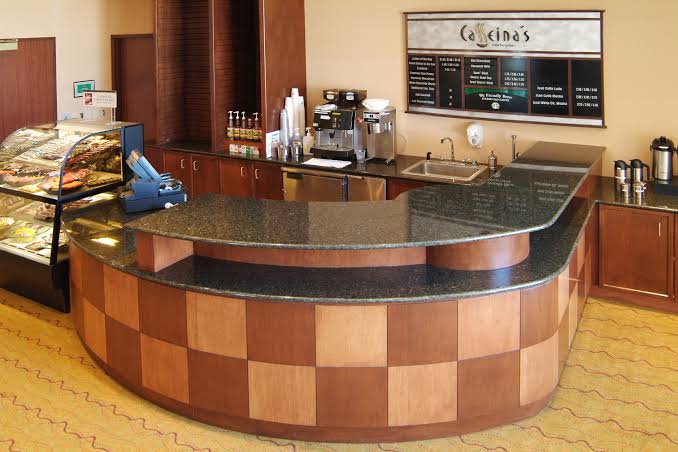
Determine Appropriate Counter Height
Consider how high the counter will be and how comfortable diners will feel when seating. The counter should be constructed to accommodate various barstool heights and offer an ergonomic workspace for bartenders. Basically, the standard height for bar counters is 40-42 inches i.e., 101-107 cm. However, this can be altered based on specific reasons, such as the average height of the bartenders or the style of barstools used.
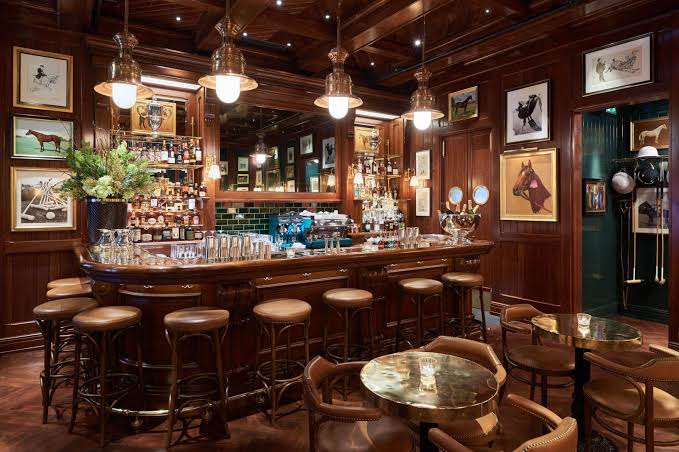
Create a Design with Curved Edges
When designing commercial bar tops, there is no limitation on the type of edges to use. Other than using straight lines, the bar tops can be shaped to be curvy to be more eye-catching and unique. The degree of curvature can vary, ranging from subtle curves to more pronounced arcs depending on the desired aesthetics and space available.
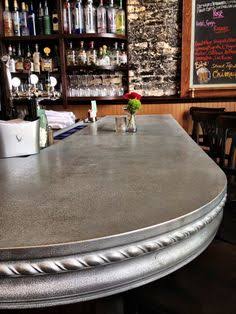
KKR: Customize Your Restaurant Countertops
KKR is a professional manufacturer of solid surface products with over two decades of experience in making various designs of solid surface restaurant countertops.
Custom Options
With a wide range of expertise, KKR has the capacity of producing different types of bar countertops using solid surfaces. We offer broad customization options, which include more than 3000 mature and mass-producible colors to choose from, over 127 texture patterns to choose from of which 80% of them are KKR exclusive, meaning that your restaurant counters will be unique from others on the market.
Additionally, our unmatched strength extends to the creation of a variety of designs, including different shapes, edge profiles, and geometries of commercial bar tops.

Full-Cycle Manufacturing
At KKR, we execute a streamlined full-cycle production, which includes fast production speed, large output, stable quality, and stable price. We have a professional team and a large production factory filled with cutting-edge machinery, which ensures that your small and bulk commercial countertop orders are produced and completed within the shortest time frame.
With 90% production line automation, optimal quality is guaranteed with every batch of commercial bar counters manufactured. We always have sufficient raw material reserves, which enable us to maintain a stable price for our products and provide customers with an affordable quote.
Conclusion
The countertop is an important part of the restaurant setup. It serves as a point where diners make orders and sometimes sit. There are many materials used for making restaurant countertops, but in this post, we’ve streamlined them to the 7 most common ones, in order to help with your decision-making.
KKR specializes in using solid surface materials to make bar countertops that last for years while maintaining high performance. We have a responsive team at your service to offer additional assistance any time of the day. So if you are looking for the best solid-surface commercial bar counter, contact us today to get started.



